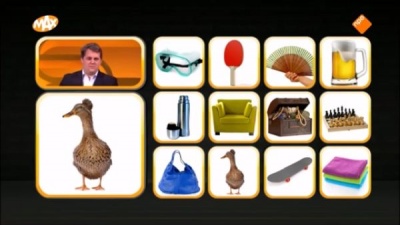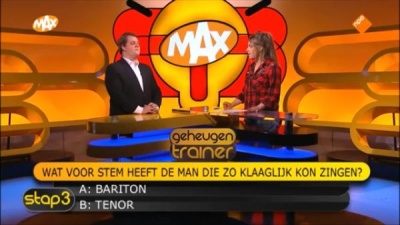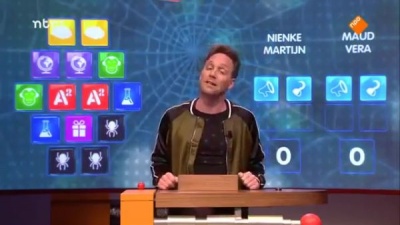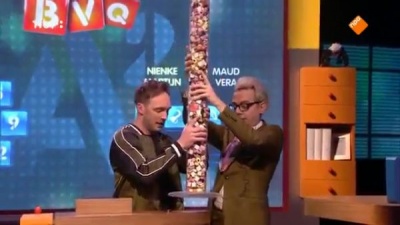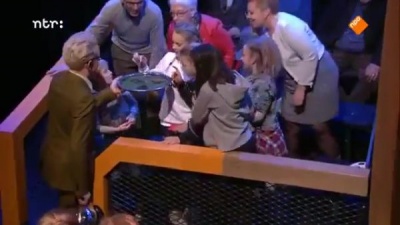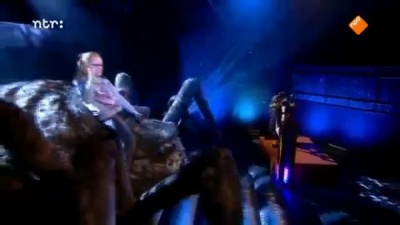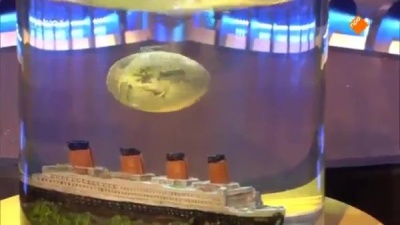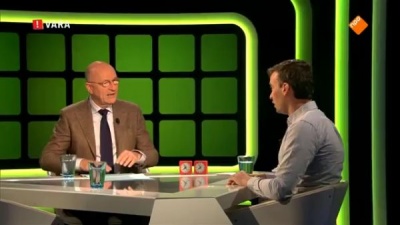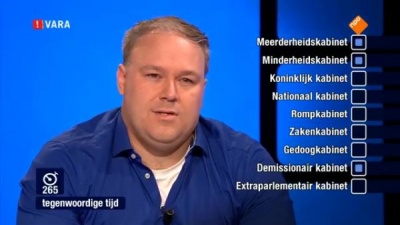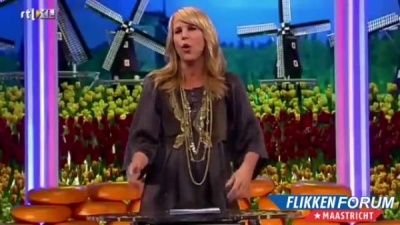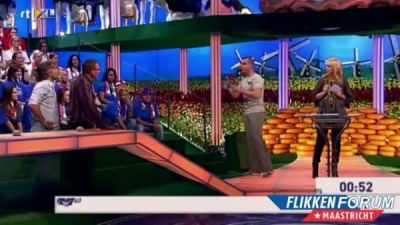Weaver's Week 2018-09-23
Last week | Weaver's Week Index | Next week
Goedendag van Amsterdam! Het Week is en Holland om te helpen met het DASH puzzel jacht. We beoefenden onze Nederlanders door televisie te kijken. Hoeveel taal kunnen we leren van de game shows?
Hello from Amsterdam! The Week is in Holland to help run the DASH puzzle hunt. We practised our Dutch by watching television. How much can we learn from the game shows?
Following a recommendation, we've been using the Duolingo app to get a basic grounding in Dutch. It only takes us so far, and we quickly spotted that it's no substitute for real Dutch, spoken by real Dutch people. We're assessing these programmes both as television game shows, and as ways to help learn the language
Contents |
Max Geheugentrainer
What is this? It's like the Mental Agility round on The Krypton Factor, spun out into a fifteen-minute programme. The show begins by asking the contestant to remember eight items on a shopping list.
Then there's "Letterfall", a round where letters appear in a long compound word, in the style of Letterbox but where the producers choose the letters. An archive clip is an excuse for observation questions, this-or-that queries with options on screen.
There's a memory round, where did each of these 12 objects appear on the board? Another archive clip is included so the show runs to time – and so the contestant has more time to forget the items on the shopping list. They'll win a prize if they remember all eight items on the list, otherwise the player will leave with nothing.
Other episodes replace "letterfall" with anagrams, or whether a particular maths sum is right or wrong.
Is it good television? To be honest, not really. The programme is bright and breezy, and at 15 minutes it doesn't outstay its welcome. But the games are basic, and most of them are just there as an advertisement for the "brain training" app. A viewer competition is organised by post.
Smoking jackets or tracksuits? (Thanks to the Fingers on Buzzers podcast for this idea.) Smoking jackets.
How good is it for learning the language? Excellent to reinforce vocabulary. The first round has eight regular household items, all depicted on screen. You might be able to guess "Pastasaus", but not sure what "Geraspte kaas" is? Ah, grated cheese. The memory board also uses familiar objects, and announces their names. We also see some complex vocabulary, words such as "gedoogbeleid", the uniquely Dutch principle of tolerance.
Any chance of a version over here? In a universe where the call-in scandal 0898gate had never happened, Brain Trainer would have been running on Channel 5 for years now. We can just about see this programme fitting around Countdown on Channel 4, or as a sponsored segment into a magazine show (Train Your Brain with Phillip Schofield, anyone?)
Beste Vrienden Quiz
What is this? It's a quiz for best friends, played by children of about twelve years.
The main part of the game is hidden behind 14 numbered squares. Ten of them hide questions – two in each of geography, nature, science, IQ, and numbers-letters. There's a point for each question the pairs answer correctly, and if they get a question right, they can try to pick the question's pair for another point – and to retain control of the game. Get a question wrong, or fail to find a pair, and play goes over to the other side.
The questions are the same format on each show. Geography is always "follow this jumbo jet as it flies at 600m around the Netherlands" and something where they digitally alter pictures of the team.
Numbers-letters is "spot the spelling mistake in the subtitle"; and "moor of minder", the traditional "one team says how many sweets there are in the jar, the other team says more or less".
IQ will ask for the final score in a rock-paper-scissors match; and show the position of some dancers before asking which angle we're looking at them from. We saw exactly this type of question on Brightest Family with Anne Hegerty at the start of the year.
Nature is a question based on a film clip, and identify the poop that came from a particular animal. Of course, if the team choose to play "Ask the Audience" on this question, everyone has to smell the stink.
Science has the mad professor describing an obscure item in a box, and "De Titanic Test". Yes, folks, "Will It Float?" from David Letterman's Still Awake at This Hour has a regular spot on BVQ.
Teams have two lifelines. They can ask their friends and family in the audience, literally turn around and ask them. And they can "hook" a question, drag it across to their side and take control of the game.
But there are four more squares on the board. One is a present, a bonus point you get just for picking it. The other three show a spider, and the team picking two of these spiders has to take a physical challenge.
The friends take different roles here: one will sit on a cycle, and try to cycle a given distance. Their friend will sit on a spider that makes increasingly violent movements as time goes on. If the friend is still on the spider when the cycling finishes, they'll return to the sofa; should they fall, they are out of the game and take their place in the friends and family enclosure.
All of these points are used for the final – in two sample shows, we've seen a pair of 7-7 draws. Each point allows one question, and they're individual questions – the team cannot confer on these questions. There's €20 for each correct answer, and only the winning side get to take their cash.
Is it good television? We've thoroughly enjoyed BVQ. It's not an expensive quiz, but makes up for this in atmosphere. The title guitar music is used as punctuation, and most of the game is played in silence. There's a small roster of characters, all well-drawn in the way children's television has to be: in this, we're reminded of Avanti un Altro.
Smoking jackets or tracksuits? From the physical activity, tracksuits for the competitors.
How good is it for learning the language? It's a children's programme, so they can use complex language or impart complex ideas, not both at the same time. We can now count to 14 in Dutch, and know "zinken" means "sink". The rounds where they describe a familiar object, or spot the Dutch word that's mis-spelled, these are rounds we can aspire to answer.
Any chance of a version over here? Hello, CITV Towers? We have a show for you, a companion for Spy School. It's all done in a studio, doesn't need to be expensive, and you could repeat it for years to come.
Per Seconde Wijzer
What is this? A highbrow and surprisingly high-octane quiz.
Presenting from the Countdown set circa 1987, Erik Dijkstra shows a contestant nine answers. He will give nine clues, each one matches with one answer, and one answer only. The contestant's job is to match the clue with the answer.
Ah, but what if the contestant says "Pluviometer" on one question, then hears "Measures rainfall" on a later clue? They can say "Pluviometer, and change that other one to Anenometer". A contestant can get very confuzzled. Eventually, the contestant will come to a conclusion, and call "Stop".
Why do they call "Stop"? This is a timed event, the contestant has just 200 seconds to complete four lists of answers. Erik's clues are brief and brisk, and it's no problem to get through four lists – unless the contestant messes up.
To help, the contestant is allowed two jokers, an incorrect answer that will be marked as correct. After they've said "Stop", but before the answers are given, the contestant can play a joker. It'll cost them, playing the joker whips 16 seconds (yes, sixteen seconds) from their clock. Should they not need it, the joker will not be returned.
Perfection is not required on this show. To win the list, the contestant needs to give five correct answers out of nine. So if they're sure on seven answers, but unsure of the last two, it's good tactics to keep the jokers in reserve. Each correct answer earns €20, and getting a list entirely correct earns a bonus joker (but not an additional 16 seconds).
Get through today's four lists, and the player has a choice – they can retire from the game, with about €600, or come back tomorrow and play a different category. The jokers and time remaining will be carried forward, and the player gets an additional 200 seconds and 2 jokers. But if the player doesn't get five in a list, or runs out of time, that's it. Game over, and they leave with nothing more than the consolation prize of a miniature clock.
Each contestant plays four lists a day, drawn from five categories: "Present tense" (current affairs and modern history), "History" (up to about 1900), "Art", "Science", and "Sports". We didn't catch whether the players pick their category, or if it's decided by the producers.
We did catch the increasing requirements – on day two, the player needs 6/9 to pass a list, and gets €25 per correct answer. On day three, it's 7/9 and €30 per answer. Most players stop here, taking around €2500 – very nice for half-an-hour's work. Should a player go for the fourth and final day, they need to get 9/9 and it's €35 per correct answer, and the total prize is doubled to around €7000.
Is it good television? There are many points of tension. The obvious one: will this contestant get through the list? Will they run out of time? Will they waste jokers? We might be able to play along at home, and shout, "Cory! You should have said 'Butterbeans' not 'Breadcrumbs'!"
And it's quite likely cheap – while they dangle big prizes, they don't pay much – we reckon there's a €2500 winner most weeks, and a €7000 jackpot winner once a month.
Smoking jackets or tracksuits? Smoking jackets. Indeed, we can imagine some of the contenders would like to draw on a pipe between rounds.
How good is it for learning the language? Fairly quick definitions of common words and phrases made us more confident in what we do know. We stood no chance with the various bits of the Dutch cabinet – a piece of "general knowledge" specific to that culture.
Any chance of a version over here? Not as it stands, Per Seconde Wijzer is essentially two solo rounds in a (commercial) half-hour show. It's a little too dry and dusty for BBC4, though no worse than Hive Minds turned out to be. We have been musing about a competition version – four players working in competition to fill a jackpot, eliminations as we go and an all-or-peanuts final. Might fill a BBC afternoon slot.
Ik Hou van Holland
What is this? A Saturday night entertainment.
Two teams of celebrities, led by Jeroen van Koningsbrugge and Guus Meeuwis, are given silly things to do by Linda de Mol. A live band sets some of them to music. There's audience participation, and an atmosphere of forced jollity.
The sample episode we saw was "Ik Hou van RTL", the 2014 celebration of RTL's 25 years of broadcasting. Rounds were themed around old RTL shows, so we saw brief clips of their hit shows, and plenty of out-takes. Mostly news-readers collapsing with a fit of the giggles, a very international phenomenon.
Rounds include, "Spell this hugemungous Dutch word that no-one's ever going to need again", "Where does this cheese come from?", and "What traditional Dutch song is the foreigner trying and failing to sing, having never heard it?" The final round is a Wheel of Fortune clone, giving points in a suitably random manner.
Is it good television? This column differentiates "Not to our taste" from "Actively bad". This is a good show, but not one we'd choose to watch too often. The programme's made with a lot of love, everyone in the studio is having a whale of a time, and a lot of that comes through on screen. But it's like being drenched with a firehose of culture from the Netherlands, it's too much to take in all at once.
Smoking jackets or tracksuits? Tracksuits. Definitely tracksuits.
How good is it for learning the language? Didn't help us much, the most we got out of it was "need to hear Dutch at a normal speaking pace, not the slow pace from language courses".
Any chance of a version over here? Been there, done that, bought the t-shirt. I Love My Country went out on BBC1 in 2013. It's perhaps best remembered for Frank Skinner trying to put a giant Yorkshire pudding on a map of Great Britain, hoping to cover Lickey End. From this moment, they may have invented 5 Gold Rings.
More Dutch culture next week, when we look at the Golden Rose winner Sorry Voor Alles, and any other matters arising from our trip.
Top Class Update
"The face of fear is something I enjoy immensely."
The second half of the heats began with Nelson from London (Santhosh, Mahnoor, Rahmeen, Rogash, Mrs. Clooney) and The Queen's School from Cheshire (Alice, Charlotte, Izzy, Abi, Mrs. Yousaf). Nelson had the better of the opening wordsearch, and took the Geography round, and buzzed first on the English question. But they got it wrong, and The Queen's School got their toes back in the door. The Queen's School visibly perk up when Susan announces the books round, and Mrs. Yousaf scores brilliantly on Test the Teacher, so many lucky guesses that she might have nipped into the newsagents for a lottery ticket. Queen's end up winners by 35-26.
Hamilton College (Nick, Harry, Adeeb, Alastair, Miss Higgins) went up against Little Chalfont Primary (Riya, Wilf, Mia, Satya, Miss Rogers). One-sided on the buzzers, Hamilton took the first three starters and raced to a fifteen-point lead. Though Hamilton were confused when the Mystery Round resolved as "flowers", they took that as well. Hamilton won by a huge margin, 48-20. It's the one flaw in First Class – when one team dominates on the starter questions, they run away with the programme.
Hordle Primary from Hampshire (Myles, Gracie, Toby, Skye, Miss Caz) took on Overchurch Junior from Merseyside (Alfie, Ruby, Deepesh, Jacob, Miss Wagstaff). A particularly tough history set (who was born in the same decade as Florence Nightingale: Rosa Parks or Isambard Kingdom Brunel) kept Hordle from getting the most out of their buzzer work. Test the Teacher gave Overchurch a good advantage, but Hordle remained in touch. A good buzzer round would have given them the game, didn't quite happen. Overchurch won by 30-27.
And in the final heat, Stanley Primary Middlesex (Declan, Flynn, Eliza, Mia, Miss Eltea) played South Morningside Primary Midlothian (Anna, Phoebe, Ellen, Matthew, Mr. Wilson). Stanley got off to the better start, finding the diagonal word in their wordsearch, and that was all to split the teams after a couple of starters. Morningside picked "Strictly Come Dancing 2017" as their pet subject, something host Susan Calman has never seen. A later round invited teams to identify "Happy birthday" in different languages, an idea they've done on University Challenge before now. Stanley pulled ahead in the later starters, and finished winners by 40-24.
We've now seen the champions of Top Class. We don't know which team it is. A report on the quarter-finals in four weeks.
This Week and Next
The death of Denis Norden, aged 96. A prolific comedy writer, and occasional performer, Norden wrote with Frank Muir for shows including Take It from Here, and lines including "Infamy! Infamy! They've all got it in for me!" A discussion about Lulu the elephant grew into outtakes programme It'll Be Alright on the Night, which Norden hosted for 29 years. His contributions to the world of game were on whimsical programmes, My Music and My Word!, both alongside Frank Muir.
BARB ratings for the week to 9 September.
- Bodyguard remains the top show on telly (BBC1, Sun, 11.1m). Strictly Come Dancing came back with its launch show (BBC1, Sat, 9.2m).
- Breadxit Burn-Off? Yesterday's news, slipping to a piffling 8.95m (C4, Tue). The X Factor moved through its umpteenth heat (ITV, Sat, 6.3m).
- Beneath all of these come Celebrity Masterchef (BBC1, Thu, 4.5m) and Pointless Celebrities with Eastenders stars (BBC1, Sat, 4.4m). The Chase scored well with its massive win (ITV, Mon, 3.35m).
- Top on BBC2 was Dragons' Den (Sun, 2.95m), with University Challenge (Mon, 2.1m) and Great Local Menu (Mon, 2.05m) behind. 1.65m for Extra Slice on C4, but 2.15m for Celebrity Big Brother on C5.
- On the digital channels, we have Taskmaster (Dave, Wed, 1.13m), A League of Their Own (The Satellite Channel, Thu, 790,000) and repeats of HIGNFY on Dave (Sun, 315,000).
Music show Got What It Takes? is back (CBBC, Mon), and so is everyone's favourite guessing game Letterbox (BBC2, weekdays). Later in the week, Gareth Malone's All Star Music Quiz (BBC2, Thu), but we have no clue what happens there.
ITV4 is in on the new shows, with action programme Take the Tower and comedy quiz Football Genius (both Tue). And it's the final of Celebrity Masterchef (BBC1, Thu and Fri).
Photo credits: Max, ntr, VARA, RTL
To have Weaver's Week emailed to you on publication day, receive our exclusive TV roundup of the game shows in the week ahead, and chat to other ukgameshows.com readers, sign up to our Yahoo! Group.


